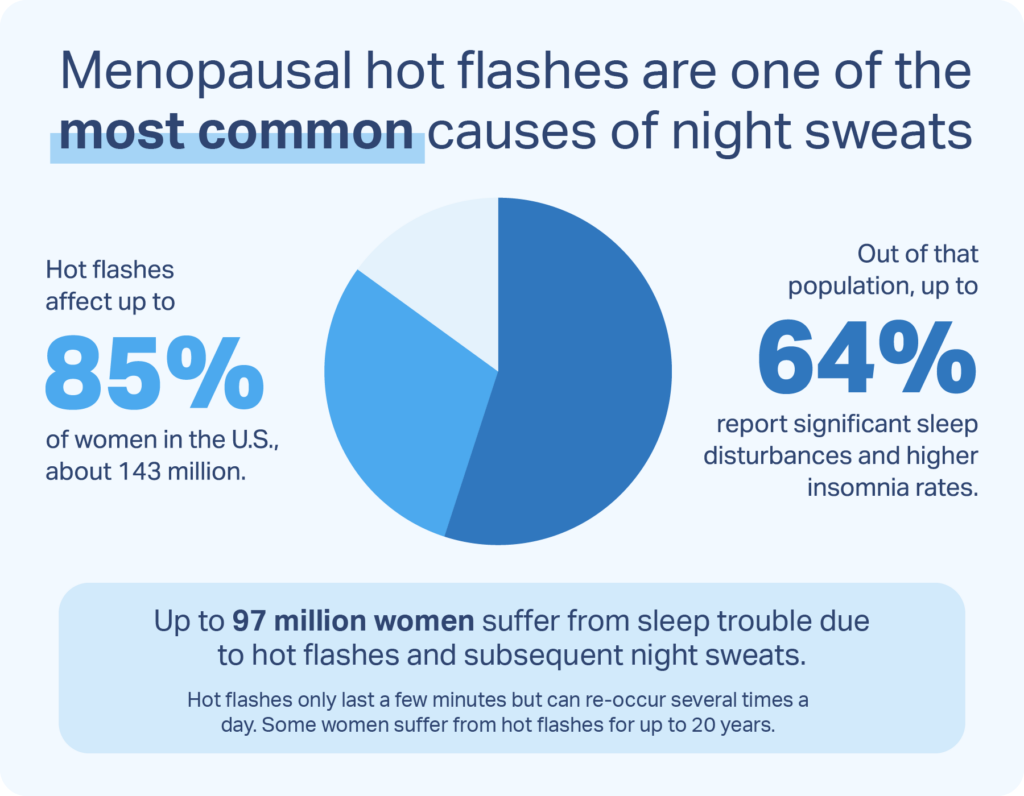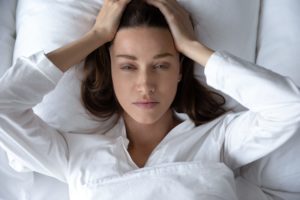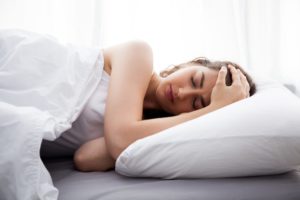What Causes Night Sweats?
Sweating is normal and a core part of how the body regulates its temperature. In a sauna or working out in the gym, sweating profusely is expected. Waking up sweating in the middle of the night is another matter altogether.
Night sweats, or hyperhidrosis, can be defined as sweating in excess of that required by the body to regulate body temperature. The body’s system for temperature regulation is complex and influenced by multiple factors, which can make it hard in some cases to know exactly what’s causing night sweats.
Fever
Fevers are an elevated body temperature of 100.4 degrees Fahrenheit (38 degrees Celsius) or greater. Nearly any type of fever can lead to excessive sweating.
Body temperature often rises in response to infections. Many infections thrive at a person’s normal body temperature, so the body may develop a fever to combat the illness.
Is Your Troubled Sleep a Health Risk?
A variety of issues can cause problems sleeping. Answer three questions to understand if it’s a concern you should worry about.
Diabetes
Diabetes can cause night sweats. In people with type 1 or type 2 diabetes, sweating can be triggered by low blood sugar, which activates the nervous system and causes symptoms like increased perspiration. A person with diabetes may also sweat after taking insulin or other drugs to manage blood sugar levels.
Nerve damage as a result of diabetes is another potential cause of night sweats. There are several types of nerve damage that can occur in people with diabetes, one of which is called autonomic neuropathy. Autonomic neuropathy describes nerve damage affecting internal organs, including parts of the digestive system, eyes, and even the sweat glands. Damage to these nerves can cause increased perspiration at night.
Hormonal Changes
Perhaps not surprisingly, many women — up to 64% — report sleeping problems and higher rates of insomnia during perimenopause and menopause. Night sweats in women and people assigned female at birth occur during following transition periods:
- Premenstrual Syndrome (PMS): Nighttime sweating can be a result of hot flashes and may also be a sign of a severe form of PMS called premenstrual dysphoric disorder (PMDD).
- Pregnancy: Night sweats may develop during pregnancy or after giving birth. One study found that more than 30% of pregnant people experience hot flashes. Around 25% of people continued to experience hot flashes several weeks postpartum.
- Menopause: Symptoms of menopause such as irregular periods, sleep difficulties, and night sweats commonly begin during a time called perimenopause. Hot flashes continue to occur in up to 85% of people going through menopause, likely due to withdrawal from premenopausal levels of estrogens in the body.
Night sweats in men and people assigned male at birth may be caused by low levels of testosterone. Without enough testosterone in the body, a person may experience symptoms like depression, reduced sex drive, and night sweats.

Neurological Conditions
Night sweats can occur as a result of several conditions that affect the nervous system. The nervous system is composed of nerves originating in the brain and spinal cord that extend into the rest of the body.
Neurological conditions like stroke, Parkinson’s disease, and injuries of the spinal cord can cause night sweats. Excessive perspiration can also be a symptom of nerve damage or an overreaction of the nervous system to normal stimulation.

Sleep Disorders
Night sweats are common in people with sleep disorders, though researchers are not sure if sleep disorders themselves cause night sweats.
For instance, as many as a third of people with obstructive sleep apnea (OSA) experience regular night sweats. OSA involves frequent interruptions in breathing during sleep, and the resulting drops in blood oxygen levels may induce night sweats.
Medication
Sweating at night is a side effect of many kinds of drugs including those that affect the sweat glands, the nervous system, or the regulation of body temperature. Certain medications are known to be associated with night sweats:
- Antidepressants: Antidepressants known as selective serotonin reuptake inhibitors (SSRIs) are often linked to night sweats. An increase in sweating usually begins within a few weeks of starting a new antidepressant drug.
- Methadone: Methadone, as well as several other prescription and illicit opioids, can cause a general increase in sweating.
- Hormonal medications: Medications that affect certain sex hormones, like estrogen and testosterone, may cause hot flashes and an overall increase in sweating.
Nonsteroidal anti-inflammatory drugs (NSAIDs), corticosteroids, beta blockers, antihistamines, cough suppressants, and other medicines taken to lower fevers may paradoxically cause sweating.
If you are concerned that a prescribed medication may be causing your night sweats, please be sure to speak with a doctor before stopping the drug or changing your dose.
Cancer
Some types of cancer can trigger night sweats. Lymphoma, kidney cancer, and prostate cancer are examples of kinds of cancer that may cause a person to experience excess sweating.
People who have cancer sometimes experience night sweats as a side effect of either cancer itself or the treatment they are receiving. Cancer survivors may also have night sweats even once they are in remission. Treatment usually involves treating the cancer while using lifestyle changes or medication to ease discomfort associated with night sweats.
Hyperthyroidism
Hyperthyroidism, also called an overactive thyroid, is a condition in which excessive thyroid hormone is made by the thyroid gland. Hyperthyroidism increases a person’s metabolism, which can cause the body’s temperature to go up and trigger excess sweating.
Other symptoms include fatigue, weight loss, heart palpitations, tremors, anxiety, and disturbed sleep. Night sweats and other symptoms usually respond well to treatment.
Other Causes of Night Sweats
Numerous other health conditions are associated with night sweats, including:
- Anxiety
- Post-traumatic stress disorder (PTSD)
- Chronic fatigue syndrome
- Obesity
- Gastroesophageal reflux
- Alcohol and opioid use
- Caffeine withdrawal
It’s important to note that other than underlying health issues, sleeping in a bedroom that is too warm, wearing many layers, or covering yourself with bedding that retains heat can commonly cause you to sweat at night.
How to Stop Night Sweats and Get Better Sleep
Night sweats can be worrying and bothersome, and they frequently are tied to serious sleep disruptions. As a result, it is natural for anyone dealing with night sweats to want to know how to avoid them and sleep more soundly.
While night sweats cannot always be prevented, several steps may be helpful to reduce their frequency and impact. Many of these tips overlap with broader healthy sleep tips that can be gradually implemented to make your sleep-related habits work in your favor for more consistent and high-quality sleep.
- Sleep in a cooler bedroom: Keeping the thermostat at a lower temperature can keep heat from building up around your body during the night and reduce the risk of sweating at night. Increased airflow can also help sweat evaporate and cool down the body during sleep.
- Replace your mattress: Certain mattresses are more likely to retain heat than others, especially if they conform closely and restrict airflow. A cooling mattress can prevent heat retention and help you keep cool throughout the night.
- Invest in new bedding: In addition to assessing your current mattress, you may want to consider changing up your bedding. Lightweight, breathable sheets can help wick away moisture.
- Wear breathable clothing: Tight-fitting clothes trap heat, so it is best to wear lightweight, loose-fitting clothes made with materials that are breathable and airy.
- Avoid caffeine, alcohol, and spicy foods: All of these things can cause spikes in body temperature and induce sweating. Avoiding them, especially in the evening, may cut down on night sweats.
- Maintain a healthy weight: Some research has identified a correlation between higher body weight and night sweats. Being overweight or obese can contribute to other health problems, including those that affect sleep, such as sleep apnea.
- Utilize relaxation techniques: Finding ways to relax at night can make it easier to fall asleep. Several mind-body practices have been found to help reduce stress and improve sleep, including yoga.
- Review medications: Because several medications are linked to night sweats, consulting with a doctor can help identify any medications that could be increasing sweating. The doctor may be able to change the dose or find a new medication without this side effect.
The most effective treatment for night sweats will vary for any individual patient and should always be overseen by a health professional.
When to Be Concerned About Night Sweats
You should talk to your doctor if you have night sweats that are frequent or persistent. You should also mention them if they interfere with your sleep, negatively affect your daily life, or occur with other health changes.
It is also important to let the doctor know about any sleeping problems that you have. Sleep disorders, like sleep apnea, may also be a factor promoting night sweats. With a comprehensive understanding of symptoms, a doctor can help determine the most likely cause and work with you to create a treatment plan that takes your overall health into account.
Medical Disclaimer: The content on this page should not be taken as medical advice or used as a recommendation for any specific treatment or medication. Always consult your doctor before taking a new medication or changing your current treatment.

Still have questions? Ask our community!
Join our Sleep Care Community — a trusted hub of sleep health professionals, product specialists, and people just like you. Whether you need expert sleep advice for your insomnia or you’re searching for the perfect mattress, we’ve got you covered. Get personalized guidance from the experts who know sleep best.
References
16 Sources
-
Bush, L. M. (2020, July). Fever in adults. Merck Manual Consumer Version.
https://www.merckmanuals.com/home/infections/biology-of-infectious-disease/fever-in-adults -
National Institute of Diabetes and Digestive and Kidney Disease. (2021, July). Low blood glucose (Hypoglycemia).
https://www.niddk.nih.gov/health-information/diabetes/overview/preventing-problems/low-blood-glucose-hypoglycemia -
National Institute of Diabetes and Digestive and Kidney Disease. (2018, February). Autonomic neuropathy.
https://www.niddk.nih.gov/health-information/diabetes/overview/preventing-problems/nerve-damage-diabetic-neuropathies/autonomic-neuropathy -
Baker, F. C., de Zambotti, M., Colrain, I. M., & Bei, B. (2018). Sleep problems during the menopausal transition: Prevalence, impact, and management challenges. Nature and Science of Sleep, 10, 73–95.
https://pubmed.ncbi.nlm.nih.gov/29445307/ -
Office on Women’s Health. (2021, February 22). Premenstrual dysphoric disorder (PMDD). U.S. Department of Health and Human Services.
https://www.womenshealth.gov/menstrual-cycle/premenstrual-syndrome/premenstrual-dysphoric-disorder-pmdd -
Thurston, R. C., Luther, J. F., Wisniewski, S. R., Eng, H., & Wisner, K. L. (2013). Prospective evaluation of nighttime hot flashes during pregnancy and postpartum. Fertility and Sterility, 100(6), 1667–1672.
https://pubmed.ncbi.nlm.nih.gov/24035604/ -
National Institute on Aging. (2021, September 30). What is menopause?
https://www.nia.nih.gov/health/what-menopause -
Snyder, P. J. (2022, May 5). Clinical features and diagnosis of male hypogonadism. In A. M. Matsumoto (Ed.). UpToDate.
https://www.uptodate.com/contents/clinical-features-and-diagnosis-of-male-hypogonadism -
A.D.A.M. Medical Encyclopedia. (2020, June 23). Autonomic dysreflexia. MedlinePlus.
https://medlineplus.gov/ency/article/001431.htm -
Nigro, C. A., Bledel, I., & Borsini, E. (2022). Independent association between hypoxemia and night sweats in obstructive sleep apnea. Sleep & Breathing.
https://pubmed.ncbi.nlm.nih.gov/36042066/ -
Schwartz, R. A., Altman, R., & Kihiczak, G. (2021, Mach 23). Hyperhidrosis. Medscape.
https://emedicine.medscape.com/article/1073359-overview#showall -
Das, S. (2018, December). Hyperhidrosis. Merck Manual Professional Version.
https://www.merckmanuals.com/professional/dermatologic-disorders/sweating-disorders/hyperhidrosis -
National Cancer Institute. Hot flashes and night sweats (PDQ) – Patient version.
https://www.cancer.gov/about-cancer/treatment/side-effects/hot-flashes-pdq -
Ross, D. S. (2022, February 15). Overview of the clinical manifestations of hyperthyroidism in adults. In D. S. Cooper (Ed.). UpToDate.
https://www.uptodate.com/contents/overview-of-the-clinical-manifestations-of-hyperthyroidism-in-adults -
De Leo, S., Lee, S. Y., & Braverman, L. E. (2016). Hyperthyroidism. Lancet (London, England), 388(10047), 906–918.
https://pubmed.ncbi.nlm.nih.gov/27038492/





